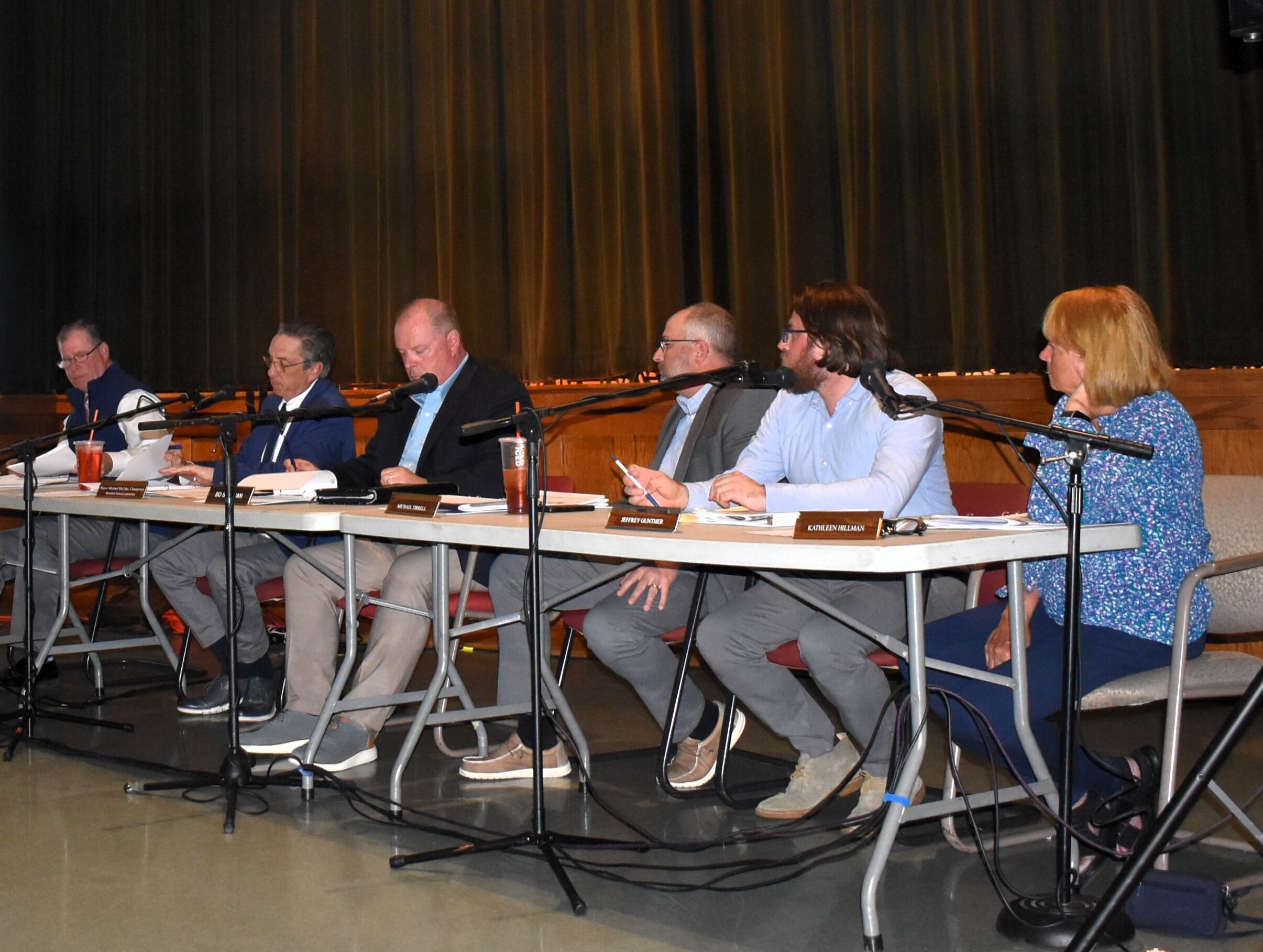Westfield School Committee hears concerns from the public about budget cuts during hearing on April 28 at Westfield Intermediate School.
Reminder Publishing photo by Amy Porter
WESTFIELD — The School Committee’s vote to accept the fiscal year 2026 budget of $75.57 million followed public participation with more advocacy for positions and programs that are among next year’s cuts, and a discussion on how a Senate earmark by state Sen. John Velis of $250,000 will impact the bottom line.
Several students and a teacher continued their advocacy for the Children’s Corner, the laboratory preschool at Westfield High School, speaking about the value of that program during the public portion. Other students and residents also spoke in support of positions scheduled to be cut at WTA.
During the meeting, Finance Committee Chair Bo Sullivan made the motion for the acceptance of the FY26 budget, but gave a figure that included the earmark. “Two weeks ago, we tabled the vote because of the $250,000 earmark initiative by Sen. Velis that was backed up by Rep. Pease. It passed the Senate, and is currently in reconciliation,” Sullivan said.
“One of the major questions we had, if approved, do we get it immediately or like everything else, not for six months. I was told as soon as it comes out of reconciliation,” he added.
Mayor Michael McCabe, who chairs the School Committee, said the earmark can’t be included in the budget, but has to go into a special revenue account, and he asked for a motion to return the budget figure to the original amount.
Business Manager Shannon Barry said the district has received earmarks before, usually for capital expenses, and they come into a special revenue account in the School Department that is separate from the budget.
Sullivan said he was a little confused. “Obviously, everybody sitting here wants to know where that $250,000 will go. I guess that’s the question I will ask.”
McCabe said, to be crystal clear, the money that the committee should be voting on is the money for the general fund of the School Department. He also said he had no intention of using the earmark for anything other than the School Department, its intended purpose.
Superintendent Stefan Czaporowski said they will take out $250,000 from items in the budget that qualify to be paid for by the earmark, and will instead use $250,000 elsewhere in the budget.
”We are moving that money,” Czaporowski said, adding that with $250,000, the School Department cannot restore all of the positions that people want restored, but the administrative team came up with some creative solutions.”
He said the district had previously planned to move literacy assistants to the libraries in the elementary schools. “We would like to put back library [paraprofessionals] at four of the elementary schools, so literacy assistants can do their jobs,” he said, costing $110,000 of the available funds from the earmark.
Czaporowski said one of the district priorities is to improve instructional practices with co-teaching models, which would have been heavily impacted by the reduction of two elementary coaches. He said they will restore the STEM and English language arts coaches at the elementary level with the other $140,000.
“I don’t want to close the Children’s Corner,” Czaporowski said, responding to the speakers earlier in the meeting. He said they have found a way to at least continue the work with child development, by working with the Career Center to place the high school students in the program in preschools in other elementary schools. He said if more Commonwealth Preschool Partnership Initiative funds become available, they would also like to put preschool programs back in Westfield High School.
When asked about the status of Chapter 74 cooperative education funds for the laboratory preschool at WHS, Czaporowski said the district looked at it before the pandemic. He said they were going to apply for a Skills Capital grant to get the equipment that would meet the Chapter 74 requirements, but COVID-19 came in 2019 and 2020, and they weren’t able to go forward with the plan.
“What are the requirements from [the Department of Elementary and Secondary Education] to move it forward, does it need to be running?” asked Sullivan.
Czaporowski said the program needs to be running to apply, and there are safety requirements such as eyewash stations, and a square footage requirement per preschooler. “We would need a Skills Capital grant to do it,” he said, adding that the Children’s Corner would have taken all of the earmark.
“I would love to add two CPPI classrooms and get them transferred into Chapter 74 programming. We came up with something, if the kids want to get that teaching experience,” he said.
Sullivan said the program that he was advocating to restore, and for which he received many calls and emails, was the manufacturing job at Westfield Technical Academy. “I think it needs to be laid on the table,” he said.
Czaporowski said it was a matter of numbers; four teachers for only 42 students with 64 slots available. “Right now, enrollment is low,” he said, adding that enrollment in Business Tech at WTA was so low they had to close the program. “Instead, we applied for and received yesterday a business technology pathway for WHS,” he said.
McCabe said one of the problems with Manufacturing Tech is a marketing problem. “We have enlisted the help of a couple of mayors in the region to come up with some sort of innovative marketing,” he said, adding that he reached out to some of the professional manufacturing advocates that spoke at the public hearing in Westfield Middle School for help in promoting the program, and a meeting is planned for June 5.
Jeffrey Gunther said he was grateful to Velis for the $250,000, but it does not solve the Chapter 70 problem. “All of the advocacy; that work needs to continue to be a conversation. I hope that we’re not waiting until March.”
McCabe said last week he was at a state advisory committee meeting. “All we talked about was Chapter 70, Chapter 74 and transportation expenses. The Senate has within its budget some remedies, but they will not come fast enough to take advantage of them. It’s kind of around the clock that we’re trying.”
“I don’t think everyone understands the depth of what you’re doing,” said Heather Sullivan. She said what she does see is people coming up with some kinds of solutions, such as placing the high school students studying early education in other preschools. “I appreciate you coming to the table and doing these important decisions the best way you can,” she added.
“This year in particular we’ve had a lot of people advocating for their programs. Thank you for the voices that you’ve provided in support of your program. I know it’s not easy to get up and speak in front of people. I thought everyone did a great job,” O’Connor said, adding that he would like to see student representation and input as new programs are developed.
“When you advocate, you should really be advocating to your senator and House representatives,” said McCabe. ”If your advocacy is going to be someplace, it should be with [the people] who created the issue.”
Bo Sullivan said the $250,000 earmark was brought by everyone who contacted Velis. “His quote was they came out in droves … It works, people listen. Especially him, he’s been very responsive to his constituents.”
“I’m glad you’re looking forward to positions that should be restored, especially when it comes to our students’ reading. The Children’s Center — I still hope those students can teach at other preschool programs. I think we really need to think about the students, which you have. Thank you,” said Kathleen Hillman.
“I appreciate the focus on literacy,” said O’Connor. The vote was then taken to approve the FY26 budget of $75,566,339, which passed unanimously.


